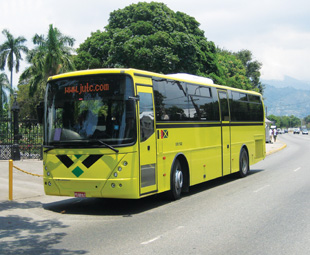VDL conquers Jamaica

GAVIN MYERS and FRANK BEETON report on important bus news from overseas.
VDL Bus & Coach seems to have a nice foothold in the Jamaican public transport sector. Jamaica Urban Transit Company (JUTC), responsible for the public transport in Jamaica, has placed a new order with VDL Bus & Coach for 230 buses. The delivery will be spread over four years, beginning with a batch of 65 buses in April 2012. This new order brings the total number of new VDL buses for Jamaica to 851.
JUTC was established by the Jamaican government in 1998, before which time the market was mainly served by minibuses operated by the private sector (much like South Africa). With the coming of JUTC, which now has four bus depots, the country’s public transport has become considerably more efficient. The new order for 230 VDL Mistrals represents further modernisation of the JUTC fleet.
The Mistrals ordered vary in length from 10,6 to 18 metres. Just as for previous orders, the buses for this order will be equipped with an air-conditioning system suited to tropical conditions. This essential feature has drawn significantly greater numbers of passengers to JUTC.
The Mistrals with a length of 10,6 metres will be used as special school buses for the more remote areas outside cities such as Montego Bay (population of 120 000) and Mandeville (70 000). Sixty buses will be used for this purpose.
The country’s largest airport is located near Montego Bay, which mainly serves the tourists who visit Jamaica. The plan is for the standard buses to also be used to establish a link to the capital city, Kingston. A railway was established between Montego Bay and Kingston in 1894, but passenger transport on this line was ended in October 1992 because the railway was in such poor condition.
VDL’s contract with JUTC includes more than just the delivery of buses. Agreements have also been made concerning the delivery of parts, technical assistance and management support.
Volvo develops plug-in hybrid bus
Meanwhile, Volvo Buses has announced that it is developing a plug-in hybrid bus. Following the sale of more than 250 “conventional” hybrids, the company is now starting work on a variant that can have its batteries charged directly from the national power grid. The operating model will see charging stations positioned at each end of the bus route, with the vehicle taking on a five- to 10-minute charge before proceeding on the return leg.
Volvo claims that this will provide “electric only” operation over distances of up to 10 km before the bus needs to start its diesel engine, with accompanying savings in fuel and emissions. The target savings include 65% of energy consumption and 75% in diesel usage and carbon-dioxide emissions.
A running prototype is expected to be completed by year’s end and operational field trials using three plug-in units are scheduled to commence in Volvo Buses’ home town of Gothenburg, Sweden, during 2012. No timing has yet been announced for commercial availability of this system, but its minimal divergence from mainstream diesel-electric hybrid technology should shorten any development period required to ensure its integrity.
Published by
Focus on Transport
focusmagsa



